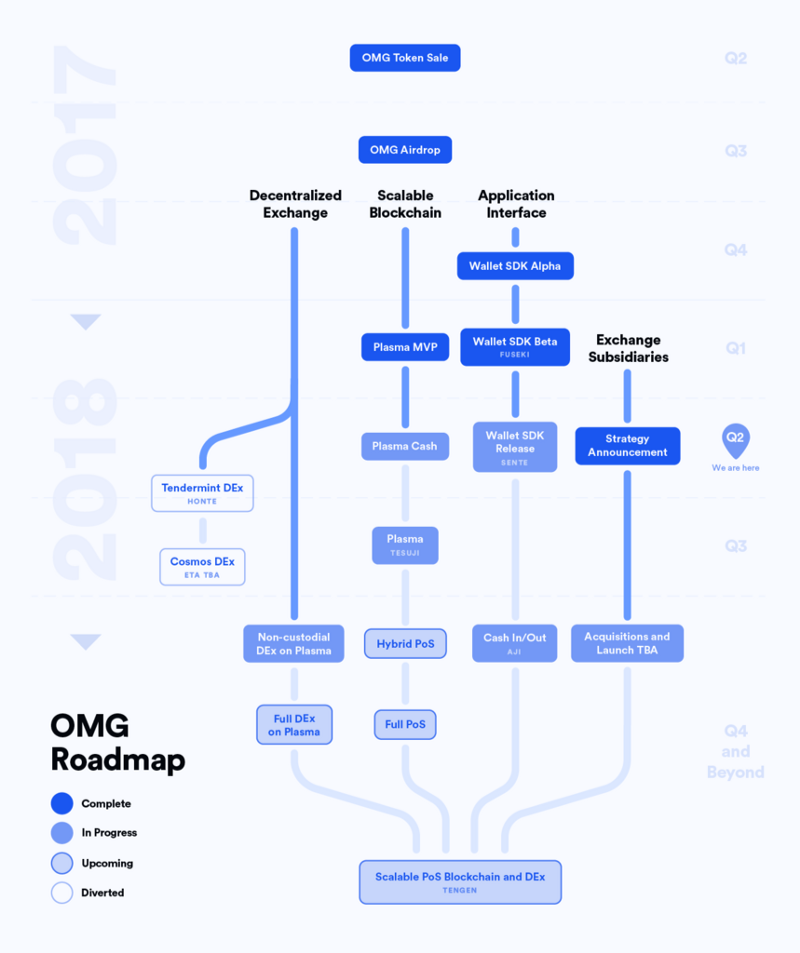OmiseGO, the Southeast Asian project which has received high praise from the cryptocommunity, has revisited their roadmap and clarified their agenda, as seen in their latest blog post on May 9. This follows a series of attempts by the team in recent months to be more forthright and transparent with regards to the project’s progress.
The team has listed out their roadmap objectives visually, which showcases how the different tasks are interrelated and come together to fit their overall agenda. Coupled with their GitHub repository, it offers investors a comprehensive look at how the project is shaping up.

While the general outline of the roadmap remains the same, there are a handful of specific changes that have been made to some of the milestones, described below.
Cosmos DEX Is No Longer Part of the Roadmap
OmiseGO and its long-term partner Cosmos Network, who are the founders of Tendermint, had intentions of building a DEX through Tendermint on the OMG Network. Unfortunately, because this is dependent on the yet-to-be-released Cosmos Network, the OMG team cannot estimate its release.
The team will continue to work with the Cosmos project to build the DEX, but this task seems to have taken a backseat, and the DEX will be built on Cosmos.
Once the DEX is launched, the OMG token and Cosmos is expected to undergo a “hard spoon.” This is different from a hard fork, where 2 chains end up competing with each other. In the case of a hard spoon, a new chain duplicates the balances of the old chain and applies that to the new chain. In this case, Cosmos’ Tendermint chain will give users a sum of Cosmos DEX tokens equivalent to the amount of OMG they hold, which can then be used within the Cosmos Network.
Plasma DEX
The much awaited Plasma-based DEX has been split across 2 phases. The first will be non-custodial, meaning that the full power of decentralization will not be brought to the DEX at this point. OMG will run a centralized service to match orders, but users will have total control over their funds. It is just the orders that will be settled through the centralized service. This is expected to come to fruition in Q4 2018.
The second phase, which has no official release date yet, will result in complete decentralization as orders are moved onto the Plasma chain. It is at this point that the DEX will be completely P2P.
Consensus Implementation
OMG will start with a Proof-of-Authority consensus mechanism, before testing a hybrid Proof-of-Stake mechanism and ultimately implementing a full PoS mechanism. PoA was selected because of its relative simplicity; the team would like to test their network with this simple mechanism before moving to staking, with its greater complexity and risk. OM
G will not receive any fees from the PoA system. Instead, any fees generated will be used to purchase OMG tokens which will then be burned. They have stated that they will not provide a release date for the switch PoS until the PoA mechanism is closer to release.
This initial Plasma implementation (codenamed “Tesuji”) will feature atomic swaps and is expected to arrive in Q3 2018. It is around that time we should expect to hear more news about the PoS implementation.
eWallet SDK
Version 1.0 of the eWallet SDK, which developers can use to build apps for wallet providers and integrate into the OMG Network, will be released in Q2 2018. This is an important step for getting more users onboard, as it lets payment service providers offer users multiple payment options and can be modified extensively. eWallets will also be able to communicate with and send tokens to each other.
This latter feature is one of the wallet’s more significant features, and, along with the ability to cash in and cash out money from wallets to fiat currency, it is one of the many things that makes OMG the unique project that it is.
Further Developments
As listed in the post, there are several other developments on the workbench. Some notable ones are:
- Exchange of non-fungible tokens
- Recurring payments
- Conditional payments —where payments are only made when a condition such as a date and time has passed, or when multiple signatures are present
- Order blinding
OmiseGO is one of the hottest projects on the market and is considered by many to be undervalued. The use of various wallets is common in Asia, and the project provides a practical solution to the problems associated with funds stored on these wallets. It is heartening to see that the team is increasingly opening themselves up to the public, which may give it the boost in exposure it needs—it certainly has the potential to compete with some of the most well-known projects in terms of market cap.
Q2 and a part of Q3 2018 will see OMG cement the foundations of the project. Barring unforeseen circumstances, the last 2 quarters of the year could potentially bring that jump in value that many investors are predicting.

